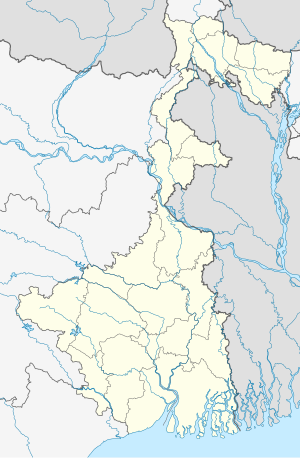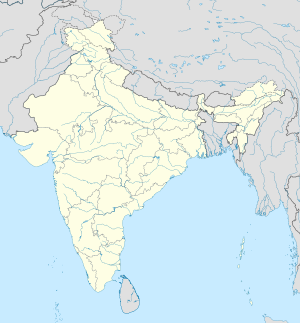Subhashgram is a neighbourhood in the Rajpur Sonarpur of the South 24 Parganas district in the Indian state of West Bengal. It is a part of the area covered by the Kolkata Metropolitan Development Authority (KMDA).[3]
Subhashgram | |
|---|---|
Neighbourhood | |
| Coordinates: 22°25′00″N 88°26′05″E / 22.4168°N 88.4348°E | |
| Country | |
| State | |
| Division | Presidency |
| District | South 24 Parganas |
| Region | Greater Kolkata |
| Government | |
| • Type | Municipality |
| • Body | Rajpur Sonarpur Municipality |
| Elevation | 9 m (30 ft) |
| Languages | |
| • Official | Bengali[1][2] |
| • Additional official | English[1] |
| Time zone | UTC+5:30 (IST) |
| PIN | 700146, 700147 |
| Telephone code | +91 33 |
| Vehicle registration | WB-19 to WB-22, WB-95 to WB-99 |
| Lok Sabha constituency | Jadavpur |
| Vidhan Sabha constituency | Sonarpur Dakshin |
| Website | www |
History
editSubhasgram has a legacy of rich history starting from the early years of British rule in Bengal. Subhasgram, named in honour of Netaji Subhas Chandra Bose, was earlier known as Changripota. Modern day Subasgram encompasses the localities of Changripota, Kodalia, parts of Harinavi and Chanditala. Subhasgram has been the home of numerous personalities, engaged either in social reform movements during the period of Bengal Renaissance or the Independence movement. Subhasgram houses the ancestral home of Dwarkanath Vidyabhsan and is also the birth place of Ramnarayan Tarkaratna, Shivnath Sastri and M.N. Roy. The ancestral houses of Sarat Chandra Bose and Subhash Chandra Bose are at Kodalia. Both of them were members of the first 24 Parganas District Committee of the Congress Party, which was formed in 1921.[4]
Geography
edit5miles
M: municipal city/ town, CT: census town, R: rural/ urban centre, N: neighbourhood
Owing to space constraints in the small map, the actual locations in a larger map may vary slightly
Area overview
editBaruipur subdivision is a rural subdivision with moderate levels of urbanization. 31.05% of the population live in the urban areas and 68.95% live in the rural areas. In the northern portion of the subdivision (shown in the map alongside) there are 10 census towns. The entire district is situated in the Ganges Delta and the northern part of the subdivision is a flat plain bordering the metropolis of Kolkata.[5][6][7]
Note: The map alongside presents some of the notable locations in the subdivision. All places marked in the map are linked in the larger full screen map.
Location
editSubhashgram is located at 22°25′00″N 88°26′05″E / 22.4168°N 88.4348°E. It has an average elevation of 9 metres (30 ft).
Transport
editSubhashgram is on the State Highway 1.[8]
Subhashgram railway station is on the Sealdah–Namkhana line of the Kolkata Suburban Railway system.[8][9]
Commuters
editWith the electrification of the railways, suburban traffic has grown tremendously since the 1960s. As of 2005-06, more than 1.7 million (17 lakhs) commuters use the Kolkata Suburban Railway system daily. After the partition of India, refugees from erstwhile East Pakistan and Bangladesh had a strong impact on the development of urban areas in the periphery of Kolkata. The new immigrants depended on Kolkata for their livelihood, thus increasing the number of commuters. Eastern Railway runs 1,272 EMU trains daily.[10]
Education
editSubhashgram Nabatara Vidyalaya Up High School is a Bengali-medium coeducational school. It was established in 1986 and has facilities for teaching from class V to class XII.[11]
Healthcare
editSonarpur Rural Hospital, with 25 beds, at Rajpur Sonarpur, is the major government medical facility in the Sonarpur CD block.[12]
Notable People
editReferences
edit- ^ a b "Fact and Figures". Wb.gov.in. Retrieved 5 July 2019.
- ^ "52nd Report of the Commissioner for Linguistic Minorities in India" (PDF). Nclm.nic.in. Ministry of Minority Affairs. p. 85. Archived from the original (PDF) on 25 May 2017. Retrieved 5 July 2019.
- ^ "Base Map of Kolkata Metropolitan area". Kolkata Metropolitan Development Authority. Archived from the original on 28 September 2007. Retrieved 3 September 2007.
- ^ "District Human Development Report: South 24 Parganas". Page 7, Chapter I: South 24 Parganas: An overview. Department of Planning and Statistics, Government of West Bengal. Archived from the original on 5 October 2016. Retrieved 15 December 2019.
- ^ "District Statistical Handbook 2014 South Twety-four Parganas". Table 2.1, 2.2, 2.4b. Department of Statistics and Programme Implementation, Government of West Bengal. Retrieved 5 December 2019.
- ^ "Census of India 2011, West Bengal, District Census Handbook, South Twentyfour Parganas, Series – 20, Part XII-A, Village and Town Directory" (PDF). Page 13, Physiography. Directorate of Census Operations, West Bengal. Retrieved 5 December 2019.
- ^ "District Human Development Report: South 24 Parganas". Chapter 9: Sundarbans and the Remote Islanders, p 290-311. Development & Planning Department, Government of West Bengal, 2009. Archived from the original on 5 October 2016. Retrieved 5 December 2019.
- ^ a b Google maps
- ^ "34792 Sealdah-Namkhana Local". Time Table. India Rail Info. Retrieved 15 December 2019.
- ^ Mondal, Bhaswati. "Commuting and Metropolitan Development of Kolkata". Retrieved 16 December 2019.
- ^ "Subhashgram Nabatara Vidyalaya Up High School". ICBSE. Retrieved 1 January 2020.
- ^ "Health & Family Welfare Department" (PDF). Health Statistics – Rural Hospitals. Government of West Bengal. Retrieved 7 January 2020.
External links
edit- Media related to Subhashgram at Wikimedia Commons
- Ancestral House of Subhas Chandra Bose

